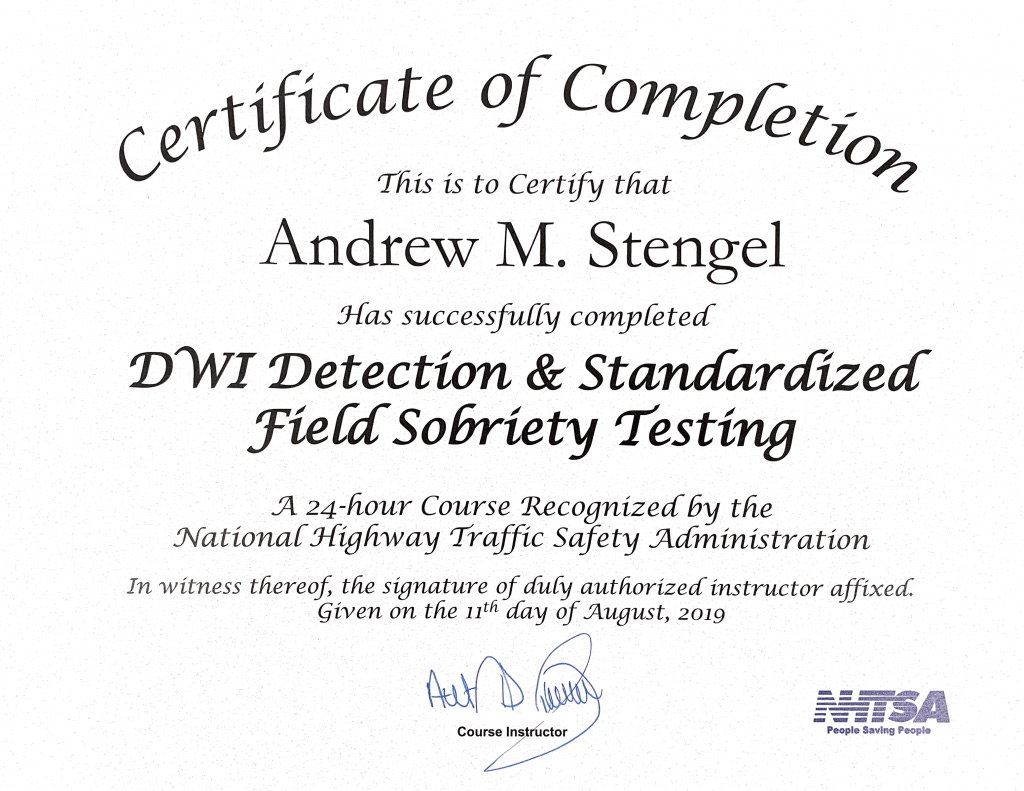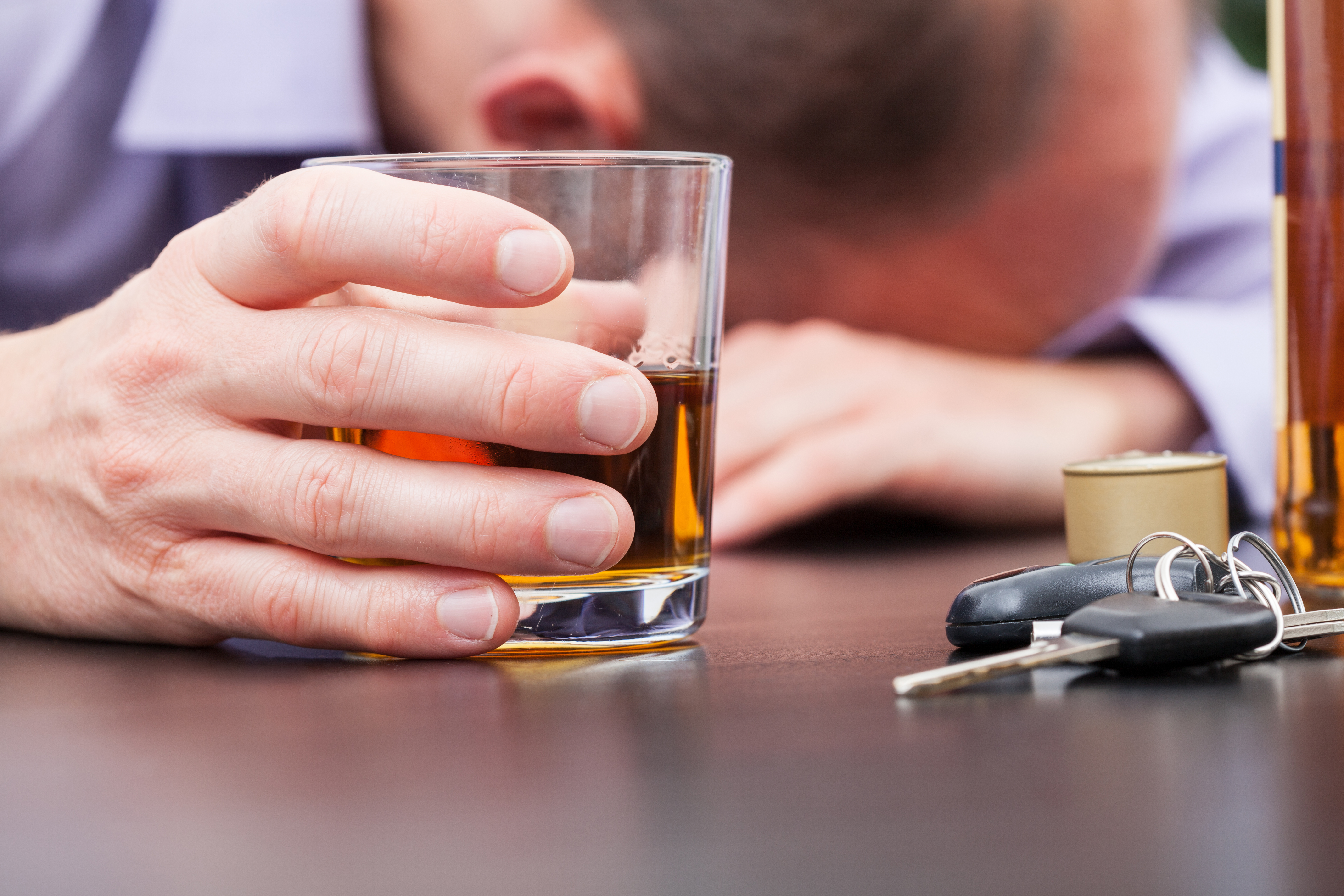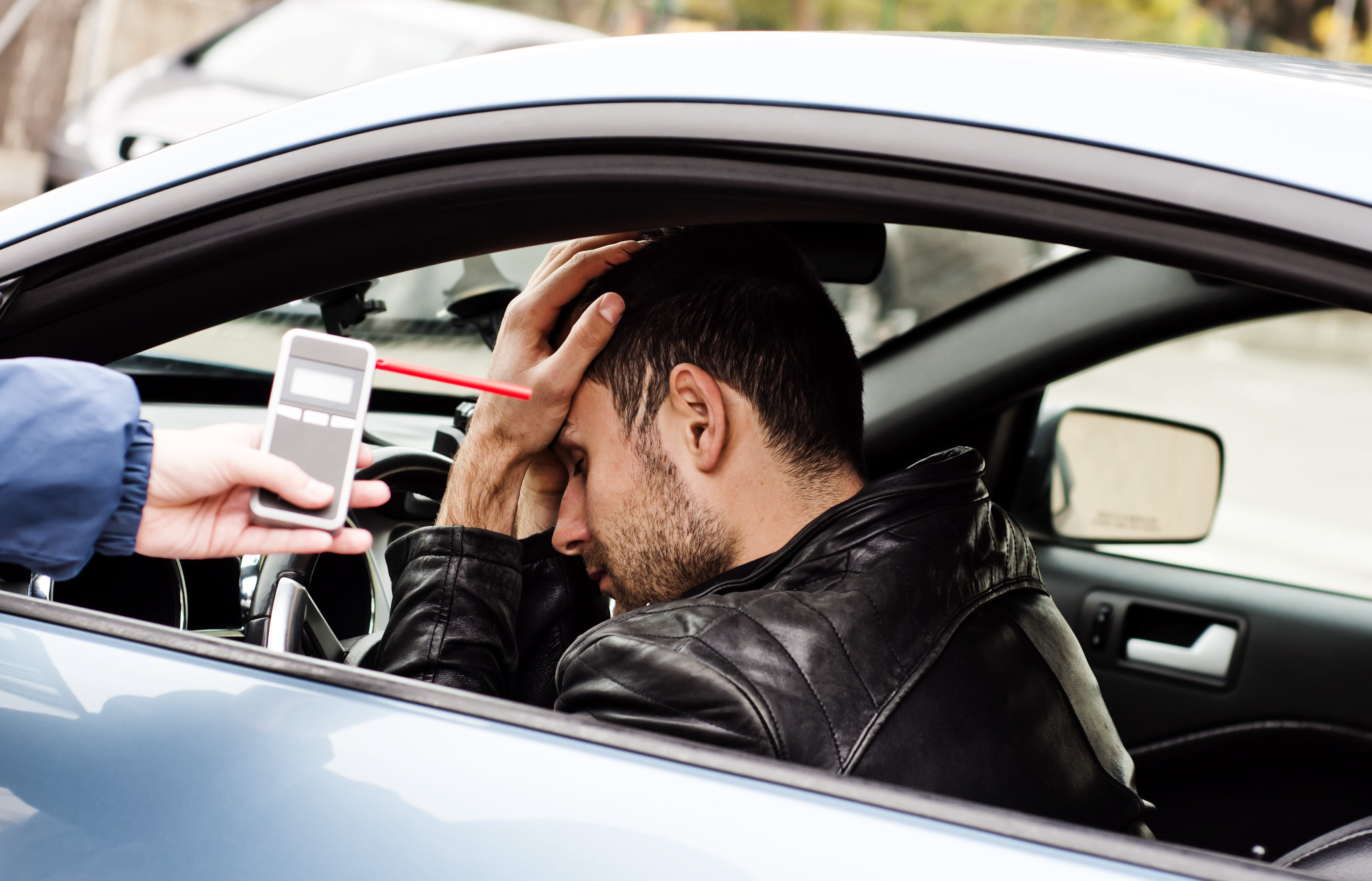New York DWI Stops and Portable Breath Tests
Under the New York State Vehicle and Traffic Law (VTL), every person who stopped by police for suspicion of Driving While Intoxicated or Driving While Ability Impaired by Drugs will be asked to submit to a chemical test, which is usually a breathalyzer. Of course, a driver has the right to refuse this test, but if arrested for Driving While Intoxicated (DWI) or Driving While Ability Impaired by Drugs (DWAI Drugs) and a person does refuse a chemical test the license to drive will be immediately be suspended under the VTL.

Andrew M. Stengel is trained the same way as police to perform DWI Standardized Field Sobriety Tests.
DWI and Portable Breath Tests in New York
If a driver is stopped for DWI then police at the scene will usually offer the driver a portable breath test commonly called a PBT. (If stopped for DWAI by Drugs the police will usually request a urine sample for a test later.) The PBT, which is a handheld device, provides a digital readout of a person’s blood alcohol content (BAC) and not a paper printout like a breathalyzer instrument at police precinct or state trooper barracks. Whether or not the BAC results of the PBT are admissible at a DWI trial depends on three factors. First, if the state recognizes the particular PBT model as an approved device. Second, if a person has properly been read the chemical test refusal warnings. Third, if the PBT was properly administered on the driver and it was in proper working order.
List of Approved PBT Devices in New York
Under New York State law, breath analysis instruments that measure BAC, known as breathalyzers, are required to be approved by the New York State Department of Health (DOH). A breathalyzer must be on the approved list of devices from the DOH Commissioner. The list, which includes more than two dozen manufacturers and 100 portable and non-portable devices and instruments, is contained in DOH regulations.
The PBT that is used by a police department differs among jurisdictions. For example, New York City, the NYPD tends to use models produced by the German company Drager and the Intoxilyzer SD-2 made by the American company CMI.
New York’s DWI Breathalyzer and Chemical Test Refusal Warnings
Before a driver is given a breath test, whether a PBT at the scene of a DWI stop or checkpoint or a non-portable breathalyzer at a precinct or barracks, police must issue chemical test refusal warnings. These warnings are required to be given under VTL Section 1194(2)(b) read:
[H]aving thereafter been requested to submit to [a] chemical test and having been informed that the person’s license . . . shall be immediately suspended and subsequently revoked . . . for refusal to submit to such chemical test [], whether or not the person is found guilty of the charge [], [if the person] refuses to submit to such chemical test [] . . .the test shall not be given and a written report of such refusal shall be immediately made by the police officer before whom such refusal was made.
Whether or not to submit to a breathalyzer or other BAC test is one of the most important and difficult decisions a person who is stopped for DWI will make. The answer depends on the specific facts of each case—blanket advice is not a good idea. A person should always request to speak an attorney beforehand. However, the right to counsel during DWI stops, which has been discussed in a previous news post, is only a qualified right.
Typically police will issue the following warnings when a driver is stopped for DWI:
- You have been arrested for operating a motor vehicle while under the influence of alcohol or drugs. I would like you to take a breath test. Will you take the test?
If a person answers “yes” then the test will be given.
If a person answers “no” or gives an answer that isn’t clear, then police will give a more specific warning:
- If you refuse to submit to the test, or any portion thereof, it will result in the immediate suspension and subsequent revocation of your drivers license or operating privilege whether or not you are found guilty of the charges for which you have been arrested. In addition, your refusal to submit to a test, or portion thereof, can be introduced as evidence against you at any trial proceeding or hearing resulting from the arrest. Will you take a breath test?
If a person persist in giving an unclear answer, which is usually after the second warning above is repeated, the test will likely be marked as a refusal.
As noted in the final refusal warning, if a driver refuses, the refusal can be used as evidence at a trial (along the lines of the pattern jury instructions) that the person refused because her or she knew that they were intoxicated. Of course, the refusal may only be used as evidence if police follow the proper procedures in issuing the refusal warnings and allowing access to an attorney, if one is requested. An experienced DWI trial attorney will always try to suppress the refusal prior to trial so that the jury will never hear about the offer of a breath or other chemical test and the refusal.
Rules for Admissibly of PBT Results at Trial
 If a driver stopped for DWI submits to a PBT, the PBT is on the approved list and the proper refusal warnings were given, then then admissibility turns on whether the test was preformed properly and if the device was in working order. First, like a breathalyzer instrument and test at a police precinct or state trooper barracks, a police officer must wait at least 20 minutes before giving a PBT under DOH regulations to guard against mouth alcohol. (DOH regulations only require a 15-minute waiting period.) Even, if there is a 20-minute waiting period, the prosecutor must establish that the PBT was in working order when it was given. That usually means that the PBT must have been calibrated before and after a given arrest. Unlike the routine calibration and maintenance of breathalyzers at police precincts and state trooper barracks, the routine calibration of PBTs are spotty at best.
If a driver stopped for DWI submits to a PBT, the PBT is on the approved list and the proper refusal warnings were given, then then admissibility turns on whether the test was preformed properly and if the device was in working order. First, like a breathalyzer instrument and test at a police precinct or state trooper barracks, a police officer must wait at least 20 minutes before giving a PBT under DOH regulations to guard against mouth alcohol. (DOH regulations only require a 15-minute waiting period.) Even, if there is a 20-minute waiting period, the prosecutor must establish that the PBT was in working order when it was given. That usually means that the PBT must have been calibrated before and after a given arrest. Unlike the routine calibration and maintenance of breathalyzers at police precincts and state trooper barracks, the routine calibration of PBTs are spotty at best.
Even if these two rules were followed, an upstate appellate court decision in 2013 raised hope that PBTs would not be admissible at trial to prove intoxication. In fact, in People v. Kulk it was the defendant who had requested that the PBT result be admitted at trial. That’s because the PBT result was .06% BAC while the breathalyzer result at the precinct was .10% BAC, which is above the .08% level for per se intoxication. However, the court held that the PBT was “not admissible to establish intoxication, as its reliability for this purpose is not generally accepted in the scientific community [and thus it] is not deemed sufficiently reliable to measure and thus establish a level of intoxication should be admissible to establish the lack of such level of intoxication.”
Since the decision in People v. Kulk, there have been a series of courts that allowed the BAC result of a PBT to be admitted at trial. For example, in People v. Ginther, a case in Staten Island Criminal Court, a judge held that the PBT results were admissible at trial, “[s]ubject to the customary threshold requirements to the admissibility of any evidence at trial, the results of defendant’s breath test are admissible.” In addition, in People v. Turner, an appellate court above Manhattan Criminal Court affirmed a DWI conviction after the PBT results at trial.
If you or somebody you know has been charged with DWI in New York, get advice from a knowledgeable and experienced criminal defense attorney who knows all the aspects of DWI law.





